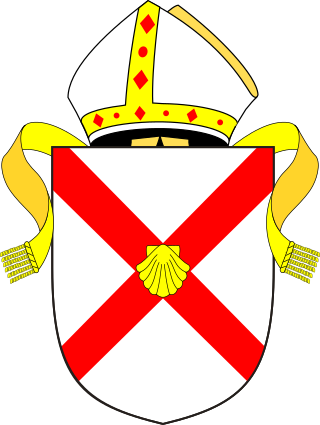Related Research Articles
John de Gray or de Grey was an English prelate who served as Bishop of Norwich, and was elected but unconfirmed Archbishop of Canterbury. He was employed in the service of Prince John even before John became king, for which he was rewarded with a number of ecclesiastical offices, culminating in his pro forma election to Norwich in 1200. De Gray continued in royal service after his elevation to the episcopate, lending the King money and undertaking diplomatic missions on his behalf. In 1205 King John attempted to further reward de Gray with a translation to the archbishopric of Canterbury, but a disputed election process led to de Gray's selection being quashed by Pope Innocent III in 1206.
Geoffrey Ridel was the nineteenth Lord Chancellor of England, from 1162 to 1173.
Eustace was the twenty-third Lord Chancellor of England, from 1197 to 1198. He was also Dean of Salisbury and Bishop of Ely.
Philip of Poitou was Bishop of Durham from 1197 to 1208, and prior to this Archdeacon of Canterbury.
John Kirkby was an English ecclesiastic and statesman.
Walter d'Eynsham, also known as Walter de Hempsham was a medieval Archbishop of Canterbury-elect.
John of Sittingbourne was Archbishop of Canterbury-elect in 1232.

The Bishop of Rochester is the ordinary of the Church of England's Diocese of Rochester in the Province of Canterbury.
Savaric fitzGeldewin was an Englishman who became Bishop of Bath and Glastonbury in England. Related to his predecessor as well as to Emperor Henry VI, he was elected bishop on the insistence of his predecessor, who urged his election on the cathedral chapter of Bath. While bishop, Savaric spent many years attempting to annexe Glastonbury Abbey as part of his bishopric. Savaric also worked to secure the release of King Richard I of England from captivity, when the king was held by Emperor Henry VI.
John Blund was an English scholastic philosopher, known for his work on the nature of the soul, the Tractatus de anima, one of the first works of western philosophy to make use of the recently translated De Anima by Aristotle and especially the Persian philosopher Avicenna's work on the soul, also called De Anima. He taught at Oxford University along with Edmund of Abingdon. David Knowles said that he was "noteworthy for his knowledge of Avicenna and his rejection of the hylomorphism of Avicebron and the plurality of forms.", although the problem of the plurality of forms as understood by later scholastics was not formulated explicitly in Blund's time. Maurice Powicke calls him the "first English Aristotelian."
William of St. Barbara or William of Ste Barbe was a medieval Bishop of Durham.
William Chillenden, also known as Adam of Chillenden, was a monk at Christ Church Priory, Canterbury, and treasurer of that priory when he was elected Prior of Christ Church in 1263.
Simon Langton was an English medieval clergyman who served as Archdeacon of Canterbury from 1227 until his death in 1248. He had previously been Archbishop-elect of York, but the election was quashed by Pope Innocent III.
William Langton was a medieval English priest and nephew of Archbishop Walter de Gray. William was selected but never consecrated as Archbishop of York and Bishop of Carlisle.
John of Fountains was a medieval Bishop of Ely.
Ralph Walpole was a medieval Bishop of Norwich and Bishop of Ely.
John Salmon was a medieval Bishop of Norwich.
William Scot was a medieval Bishop of Durham-elect.
Thomas de Melsonby was a medieval Bishop of Durham-elect and Prior of Durham.

Richard Marsh, also called Richard de Marisco, served as Lord Chancellor of England and Bishop of Durham.
References
- Greenway, Diana E. (1971). Fasti Ecclesiae Anglicanae 1066–1300: Volume 2: Monastic Cathedrals (Northern and Southern Provinces): Canterbury: Archbishops. Institute of Historical Research. Retrieved on 1 January 2009